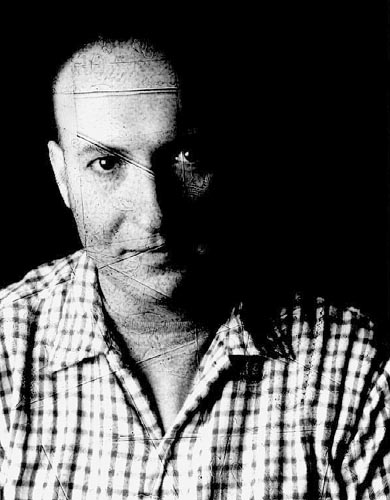| Guitar (USA) October/November 1997 |
|
The Composing Guitarist 1 & 2 |
by Rich Maloof |
|
|
Bob Mould |
In the car and suddenly you've got this great riff but you have to scramble into the 7-11 to get a notebook and they're playing some Barry Manilow song," he laughs, "that can wipe it out really quick. "Just hit 'record'. As soon as something interesting happens, try not to stop; just reach up and hit record and have a tape queued up and ready to go. I have scratch-pad tapes queued up at all times so I don't have to start fumbling for a compressor or to tune a guitar or something. Nobody else is going to hear my scratch-pad tape, so why be self-conscious about it?" Mould doesn't read notation - at least not standard notation. But he stresses that any way you can take the ideas down clearly is valid. "Notating to magnetic tape is the best way, but in a pinch I think one has to be creative with notes. I used to get hung up on it when I was younger, and I've talked with other writers who get hung up thinking it's sort of stupid to write down some description on paper; that this song sounds like toothache, this song sounds like purple paint. People will be, like, 'Arg! My pride!' But again, who's going to see that unless your manuscripts get published 50 years after you're dead?" We struggling songwriters know it's always tough to let go of a melodic idea - even if it's a bad one. The fear that we have a finite number of ideas keeps us hard at work even when we intuit we're headed for a dead end. Having written for so long (and so well), Bob Mould has an early sense of whether or not a song is worth pursuing, and it saves him a lot of time and heartache. "If they're good, I find them easy to build on and easy to shape. With the bad ones, I try to build on them for a bit and they just get worse. I figure if I'm struggling with where to go, it can't be that good of an idea. The good ones take you there; the bad ones make you fight with them." Quite an achievement, then when Mould simultaneously composed and recorded a song for his self titled release. Though he talks about it matter-of-factly, it's really an astounding feat and a goal any songwriter strives to reach. Says Mould, "The really nice ones spill out all at once, like 'Thumbtack' did. That's a work tape. The version that's on the record is as I was writing it off the top of my head. I had a few lyrical ideas sketched out on a piece of paper, and I just picked up the guitar and started fumbling for a chord change. And when I hit the first chord of the first verse, the next five minutes was just improv. That's how the good ones happen. It's very rare. I wish I knew how to make it happen more often." |
|
W hat better way to launch a songwriting column than with the wisdom and ingenuity of composing guitarist Bob Mould. Whether he delivers his song in a raucous trio format (as he has with Hüsker Dü and Sugar) or as a solo performer, Mould's keen, lucid composition sense has always cut through the medium. In the liner notes to his latest release, 1996's Bob Mould, he notes, "This one is for me". The threadbare presentation of songs on that album makes it all the more obvious that Mould has a gift for getting his material from idea-stage to performance-stage completely unmediated by arrangement or instrumentation.In this first of two installments with Mould, he tells how he captures ideas when the songwriting muse pays a visit. "As I get older, I find that writing is not the act of sitting down at a point in the day and thinking, 'Okay, it's time to write songs,'" he says. "I find the songwriting process is about creating an environment for yourself where you're comfortable getting in touch with the things that are on your mind, consciously or unconsciously. I like to be around when my mind starts opening up and try to find the most accurate way to document whatever that feeling is. "I don't look for it as, 'Oh, I'm starting to come up with an idea for a song.' It's just that something is happening, and I'm not going to get in the way. I'm just here to make sure it gets onto paper or onto tape. Once all the inspirational part happens, after a little bit of distance the craft part comes in." Many songwriters lose something in that transference; you might have a great idea in your head, but by the time it makes it into the real world, it's lost a crucial element. But with a clear mind and ready hands, says Mould, you can pull that song in. "Have the common sense to have your tools available, whether it's pen and paper, a boom box, a dictation machine, a 24-track, or a MIDI hookup. It's [a matter of] being able to catch the essence as it goes by. If you're
|
||
|
|
Bob Mould (part 2) |
Not to say that he takes that second stage casually. Though he's been known to let his hair down for fierce, chaotic jams, Mould is a meticulous producer in the studio. "Yeah, I like to have all the I's dotted and the T's crossed. That's the fun part, being able to shape sounds exactly as you hope people will interpret them. And no two people hear things the same way - or, we may all hear the same thing, but nobody interprets it the same way, so I just go for what I like," he laughs. "I want everything to be there for a reason. I don't want extra things for no good reason. But I'm not averse to accidents happening, either. I'm not that rigid. A lot of great things happen by accident. I know the components are really crucial to building a story and, emotionally, to taking people into the story with music. A lot of them are pretty much set in stone, but sometimes weird accidents happen in a studio setting - whether something is crosspatched or an instrument is tuned differently - and some nice Freudian slips come up. It's like, 'Whoa, this isn't what I thought it was at all!'" Locking together lyrics and music is where many songwriters go wrong. Even if you're on track in the writing process, the best of us can be led astray later on down the line. In retrospect, Mould is not satisfied with the production of Black Sheets Of Rain (the follow-up to his hit solo outing, Workbook), and cites the cut "Stand Guard" as an example of how misdirected producing can kill a good idea. "I did a demo version of that song where there are no heavy electrics until the solo. But because we were trying to produce a live-in-the-studio feel, it got bulldozed. It didn't have the space that it needed. Instead of standing guard over a vast, expansive field, which is what I had in my head, it came across like I was standing guard over a ball of aluminum foil. There I am, standing guard over a gum wrapper. There was no space.... But I think that any writer has to assume the responsibility of failure, and that's part of this process." As you might imagine, Mould typically has loftier goals for his lyrics. "A lot of my stuff is first-person reality. Some of it is first-person fear, and sometimes I think if I write about the fear it won't happen. But then, invariably, it will happen!" he laughs again. "But songs can predetermine so many things. All of it is my own perspective, even if I plug myself into the position of another person. I might observe a relationship going bad between friends and think about what I would do or how I see it. I take a lot of different perspectives, but the common thread [in my songs] is how I see things. "I tell everyday stories about how people interact. For me it's about time and distance and how all of us fit in around those things, because that's how we measure things. That's a big, big arena - it's a lot bigger than it sounds. Sometimes I think, God, my scope is so narrow. But then I always find, as my life goes on and as lives go on, it always changes and gets more complicated. But sometimes it does get simpler." |
|
I f you've hear even a stitch of Bob Mould's music (or read October's column), you know what his approach to songwriting is unique and uniquely successful. Last month we saw a little light when Mould described how he captured ideas. This month he offers insight on actualizing them. While documenting a song idea is a talent unto itself, getting the song to the performing or recording stage without destroying its core is just as hard. In power-trio settings like Hüsker Dü and Sugar, Mould wrung out his songs in minimalist settings, reducing the risk they would be led astray by other players. Still his songwriting philosophies seem best suited to a solo artist."To me, the emphasis has to be put on composition and content, as opposed to the expression of the idea," he says. "You lose the essence a lot of times. It really depends on the people you work with and on the nature of the material. For the current album [1996's Bob Mould], I really wanted to show people how I hear things. And yeah, the drum programming is a little stiff; I'll be the first to admit it doesn't swing like a real drummer. But I wasn't into trying to explain to [other players] the essence of the record. I just wanted to go with what I heard, how I structured it, how I demoed it. There are so many different steps of how things get diluted. The other end of it is an album like Sugar's Beaster, which was really interpretive and loose, and people were left more to their own interpretive devices - and that had a great feel to it, too. But it's different when I go in knowing that there's not going to be much interplay with other musicians." In the composing mind of Mould, the genesis of a song and the process that brings it life are separate. In fact, they sometimes work at odds with one another. It's tough to maintain a song's central idea while creating the structure that will hold it up. "When you get the essence of the song in a place where you can sort of evaluate it and try to shape it from a unique writer perspective, then you get involved with the mechanics of writing songs. I start to think about the different components for the song: tempos, signatures, how the story is to unfold, choice of key, choice of mode... all those things. Once I think I understand the essence, then I can start to apply the acquired knowledge and mess with the different components. "I think people get hung up on things like, 'It's gotta go to the minor 6 here.' That stuff comes later in the process. That's not about writing. That's about setting components together, rather than the essential part, the side of you trying to get out." |
||

